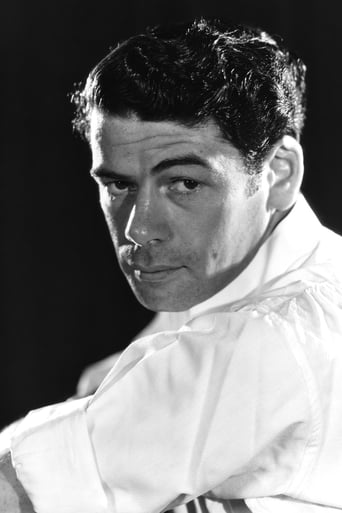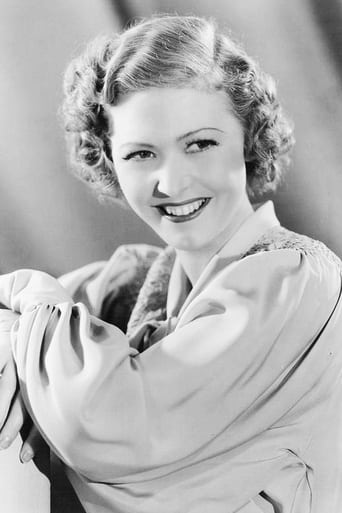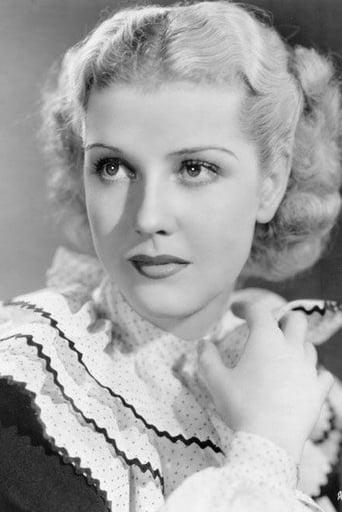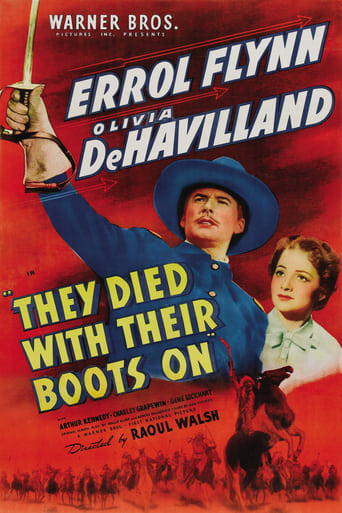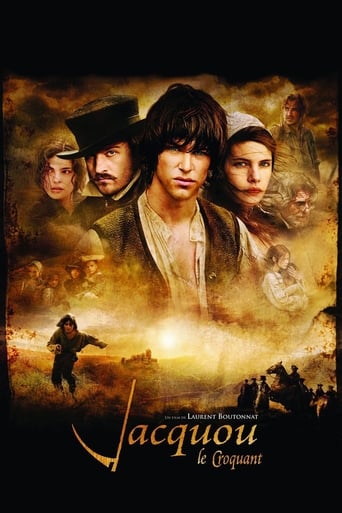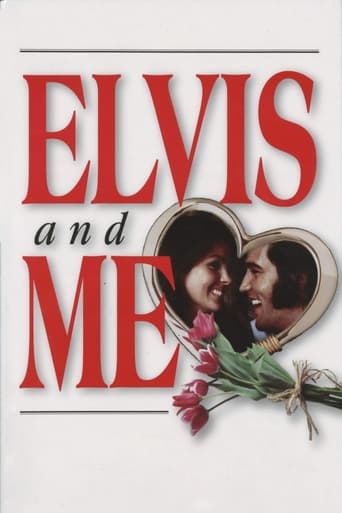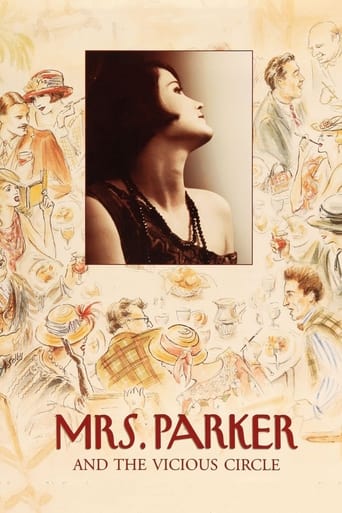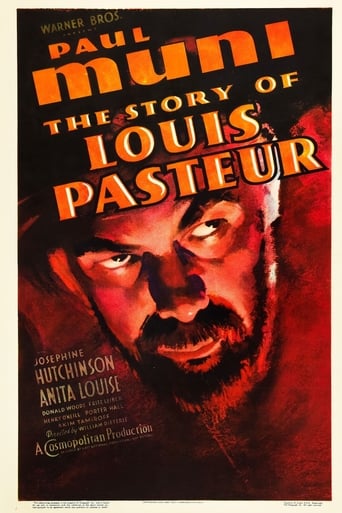
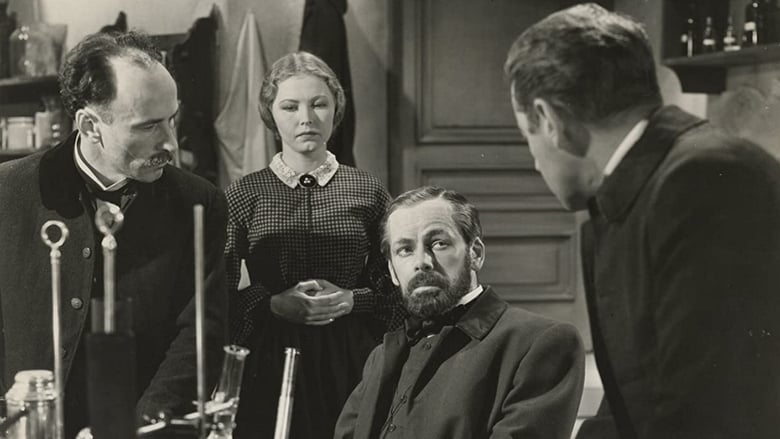
The Story of Louis Pasteur (1936)
A true story about Louis Pasteur, who revolutionized medicine by proving that much disease is caused by microbes, that sanitation is paramount and that at least some diseases can be cured by vaccinations.
Watch Trailer
Cast
Similar titles

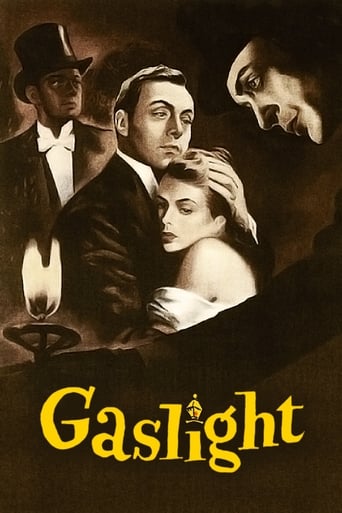
Reviews
I think this is a new genre that they're all sort of working their way through it and haven't got all the kinks worked out yet but it's a genre that works for me.
Load of rubbish!!
The acting in this movie is really good.
The story, direction, characters, and writing/dialogue is akin to taking a tranquilizer shot to the neck, but everything else was so well done.
A tasteful and thoughtful fictionalization of Louis Pasteur's development of vaccines for anthrax and rabies that nevertheless peddles in the kind of hagiography one would expect from films of this time period, when things like subtlety were in short supply."The Story of Louis Pasteur" was a prestige pic from Warner Bros. off-shoot Cosmopolitan, designed to win the studio acclaim and Oscars. It did both, scoring a Best Actor win for Paul Muni, eminently watchable as Pasteur but who deserved to win both three years earlier for his intense performance in the intense "I Am a Fugitive from a Chain Gang" and a year later for his performance in another Warner Bros. biopic, "The Life of Emile Zola." Indeed, there is speculation that 1936 saw a lot of vote rigging in the Academy and that Muni's win was the result of some under the table deals among studio execs to ensure that certain actors and certain films would win key awards. But it's the kind of role and performance that could easily have won on its own merits, and indeed biopics have been one of the surest vehicles for actors seeking Oscar noms and wins ever since.The film also won two writing awards, the first of only four films in Oscar history to do so, when rules allowed both the screenplay and the original story on which it was based to be eligible even if written by the same people, which in this case were (Pierre Collings and Sheridan Gibney). Its fourth and final nomination was for Best Picture, in a year that found the other nominees in that category to be "Anthony Adverse," "Dodsworth" (my personal favorite), "Libeled Lady," "Mr. Deeds Goes to Town," "Romeo and Juliet," "San Francisco," "A Tale of Two Cities," "Three Smart Girls," and that year's winner, "The Great Ziegfeld." Grade: A-
In 1860 Paris, doctors are collectively disgruntled by chemist Paul Muni (as Louis Pasteur). He advises surgeons, "Wash your hands. Boil your instruments. Microbes cause disease and death to your patients." In the opening scene, a doctor is shot due to his patient believing in Pasteur's advice. The controversy causes problems for Pasteur. Ten years later, the renowned man works on cures for anthrax (the black plague) and rabies (after a dog bites Dickie Moore)... This is an exceptionally well-produced, straightforward biography of Louis Pasteur by director William Dieterle and the crew at Warner Bros. Paul Muni forwarded his film career considerably. He is nothing less than perfect, and Mr. Muni won a much-deserved "Best Actor" Oscar for his performance. So many early "Academy Awards" were chosen due to politics, popularity and promotion. It's nice to see the old Academy occasionally got one right... The film is lacking, however, in not presenting Pasteur as a younger man (oddly, Muni is only made to look older). And, the fact that you drank "Pasteurized" milk isn't even covered.******** The Story of Louis Pasteur (1935-11-23) William Dieterle ~ Paul Muni, Josephine Hutchinson, Fritz Leiber, Donald Woods
Many of us see 1939 as a watershed year in American cinema. Not just because of the quality of film elements, but also because of a maturity in scripts. In a sense, I always compare films in this general period to "Gone With The Wind". And compared to GWTW and several other films of 1939, this film -- made only 3 years earlier -- seems very old-fashioned. That is not to say that it is not a good film. It is excellent.It's one of several great bio-pics of that era, and one that earned its star (Paul Muni) an Oscar, as did the screenplay. Both well deserving.I'm sure that there will be those who will point out inaccuracies in the film...liberties that the screenwriters took to make it a good story. But, from what I can see the gist of the story is accurate and makes the key point -- how daring such early scientists were, basically starting with nothing but an idea, pursing it, and developing great discoveries. It is really is rather inspirational.The cast here is superb. As I mentioned, Paul Muni received the Best Actor Oscar, and it was only right that he did. A number of the supporting actors did a terrific job as well: Josephine Hutchinson -- a much underrated actress as Marie Pasteur. Donald Woods as an associate doctor. Halliwell Hobbes as Dr. Lister. And more.A wonderful bio-pic; highly recommended...and perhaps deserving of a place on your DVD shelf.
1936 was the career turning point year for Paul Muni. It was the year that he got the first of three biographical films at Warner Brothers that would forever give him his place in cinema history. The Story of Louis Pasteur (1827-1895) was also the film that got Muni his Academy Award for Best Actor that year.It's hard to imagine the world of science and medicine without the contributions of Pasteur. He was a chemist and as such his scientific experiments when they encroached on the medical field was greeted with suspicion and hostility. His chief critic Dr. Charbonnet played by Fritz Lieber nearly sank Pasteur's work with a bold move that I cannot tell about, but will make you gasp when you see it on screen.Josephine Hutchinson is Muni's ever faithful wife Marie and she does well by what is really a rather colorless part. It was the same for Muni in his biographical picture the following year of Emile Zola where Gloria Holden also had a part that called for little, but to look faithful. There is a nice subplot involving Donald Woods as an early convert to Pasteur's way of thinking wooing and winning daughter Anita Louise.The film goes through Pasteur's main achievements of sterilization during medical procedures and cures for anthrax and hydrophobia. The story and screenplay which also won Oscars for 1936 is simple and straightforward enough for any lay person to follow.There are several good performances of men of science who opposed and/or supported Pasteur's work, in some cases opposed then supported. Porter Hall, Akim Tamiroff, and Halliwell Hobbes who has a small part as Joseph Lister, the English scientist.Pasteur fought hard for his ideas against the medical and scientific establishment of his day and lived long enough to receive due acclaim from his nation of France and the world. It's still an inspirational story about a man convinced of the rightness of his cause and having the wisdom and perseverance to see it through.
